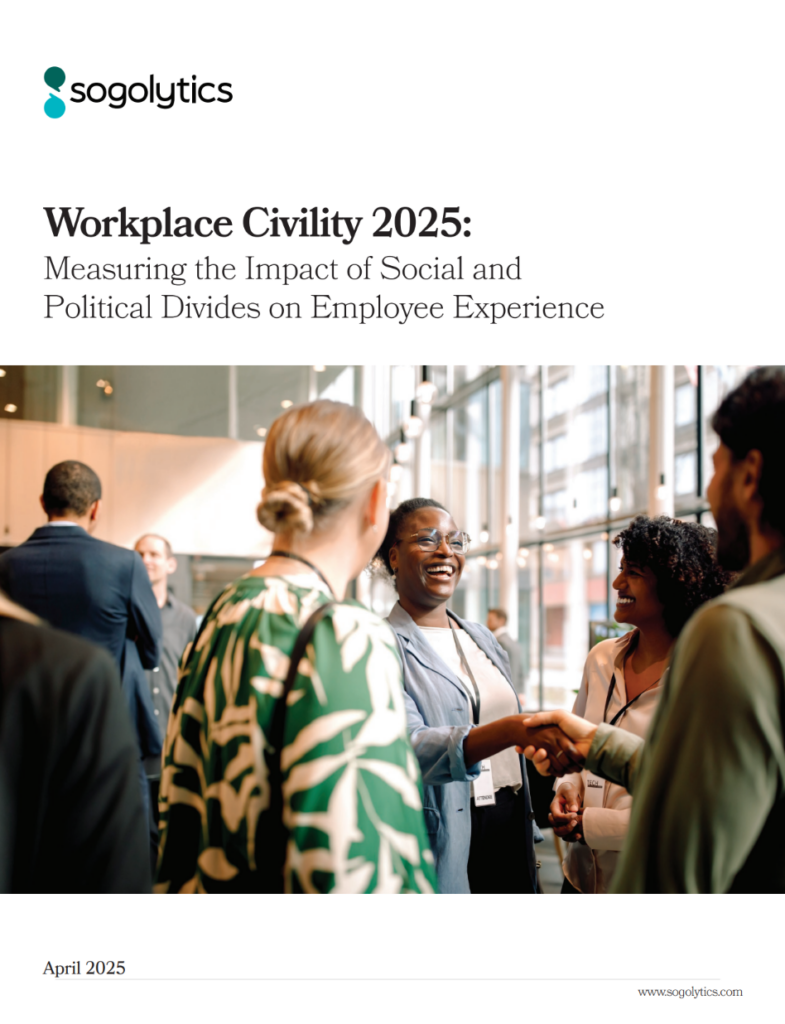If you’re looking for the TLDR version of our study results, it’s this: Civility in the workplace is no longer optional.
As political polarization and social tensions continue to spill into professional spaces, workplace civility has become a critical factor in organizational success. According to Sogolytics’ new study, Workplace Civility 2025: Measuring the Impact of Social and Political Divides on Employee Experience, respect, inclusion, and day-to-day behavior are directly influencing everything from employee retention to brand loyalty.
The findings reflect a workplace reality that feels increasingly fragile. Nearly half of employees reported witnessing or experiencing incivility in the past year. Women are particularly affected, with 55% saying they encounter disrespect frequently or occasionally, compared to 40% of men. These experiences mirror broader societal trends—SHRM’s Q1 2025 Civility Index places the national civility score at 48.8 out of 100, showing that incivility is a routine part of everyday life.
The high cost of workplace civility
Ignoring workplace civility comes with steep risks. Over half of respondents said they have either left a job (28%) or seriously considered leaving (23%) because of toxic or disrespectful environments. Civility is not a soft issue—it is a major retention driver.
Consumer behavior is shifting too. Nearly 60% of respondents said that a company’s internal culture influences their purchasing decisions. Forty-nine percent have actively stopped supporting brands associated with poor workplace conditions. In today’s digital world, internal culture easily becomes external reputation.
Trust in corporate values is fragile
While companies are increasingly vocal about commitments to civility and diversity, trust remains fragile. Forty-five percent of employees trust companies’ public commitments to DEI, but many remain skeptical, seeing them as more symbolic than substantive.
Opinions on DEI itself are divided: about one-third said DEI has improved workplace civility, another third saw no impact, and roughly a quarter believe it has caused more division. Consumers and employees are paying close attention to authenticity, not just messaging.
Three actions to build a more civil workplace
- Hold leadership accountable. Civility must be modeled consistently across all levels.
- Address incivility promptly and fairly. Employees notice when standards are not applied evenly.
- Move beyond messaging. Embed stated values into real, daily experiences.
Final thought
Workplace civility is no longer about avoiding conflict—it is about building organizations that employees want to stay in and customers want to support. Companies that lead with respect, consistency, and authenticity will stand out in 2025 and beyond.
Download the full report Workplace Civility 2025: Measuring the Impact of Social and Political Divides on Employee Experience to explore detailed findings and insights on how to build a more civil workplace.
Ready to build a workplace culture that employees and customers trust? Get started with a free Sogolytics trial today or connect with our team for a demo of our more advanced solutions to help you gather critical insights and drive real change.















